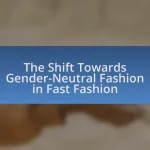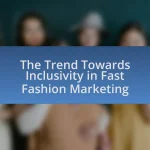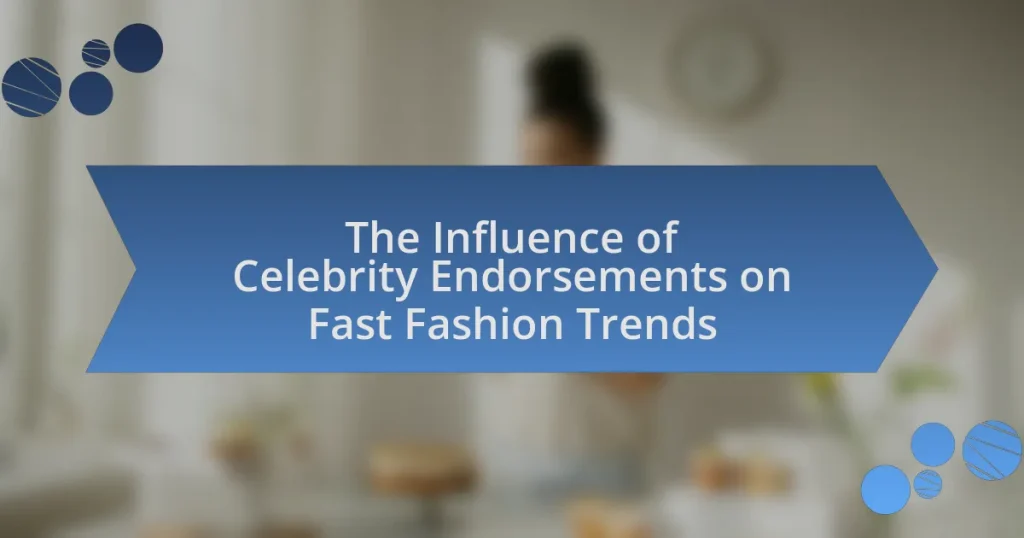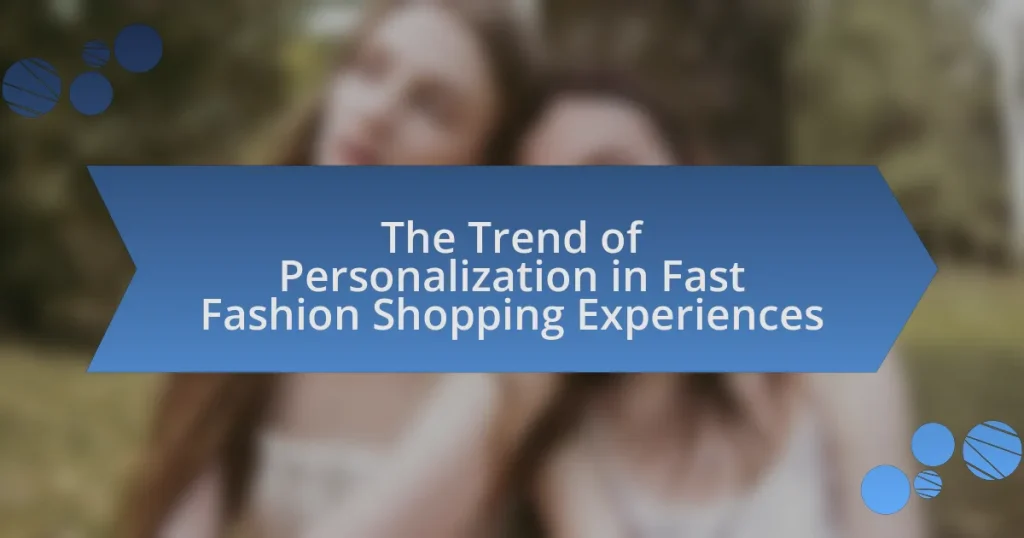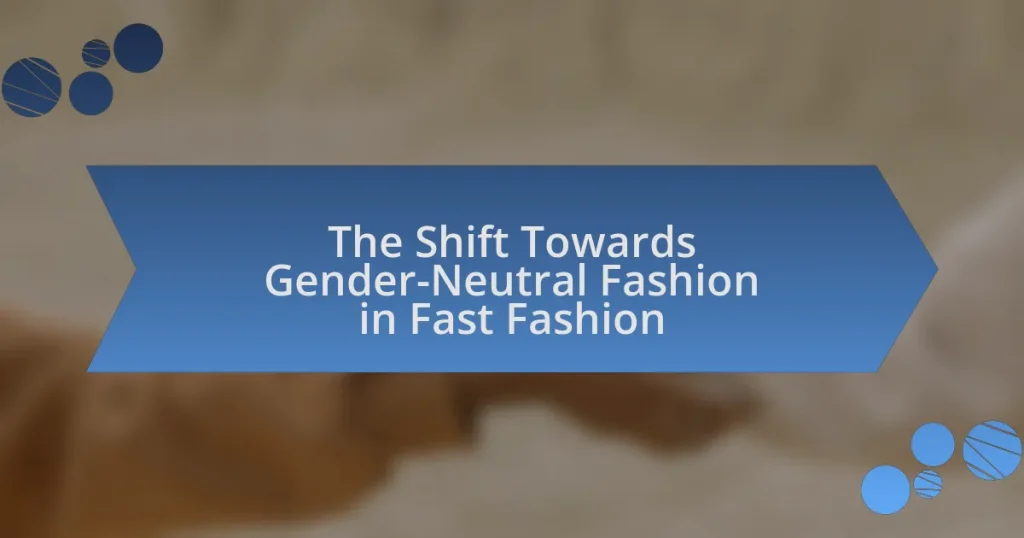The article examines the significant influence of celebrity endorsements on fast fashion trends, highlighting how these endorsements drive consumer purchasing behavior and shape brand perceptions. It discusses the psychological factors that enhance the effectiveness of celebrity endorsements, such as trust and attractiveness, and their impact on brand loyalty among consumers. Additionally, the role of social media in amplifying these endorsements is explored, along with the metrics used to measure their success. The article also addresses the ethical considerations surrounding celebrity endorsements in fast fashion, including sustainability and labor practices, and offers strategies for brands to maximize the impact of these endorsements.
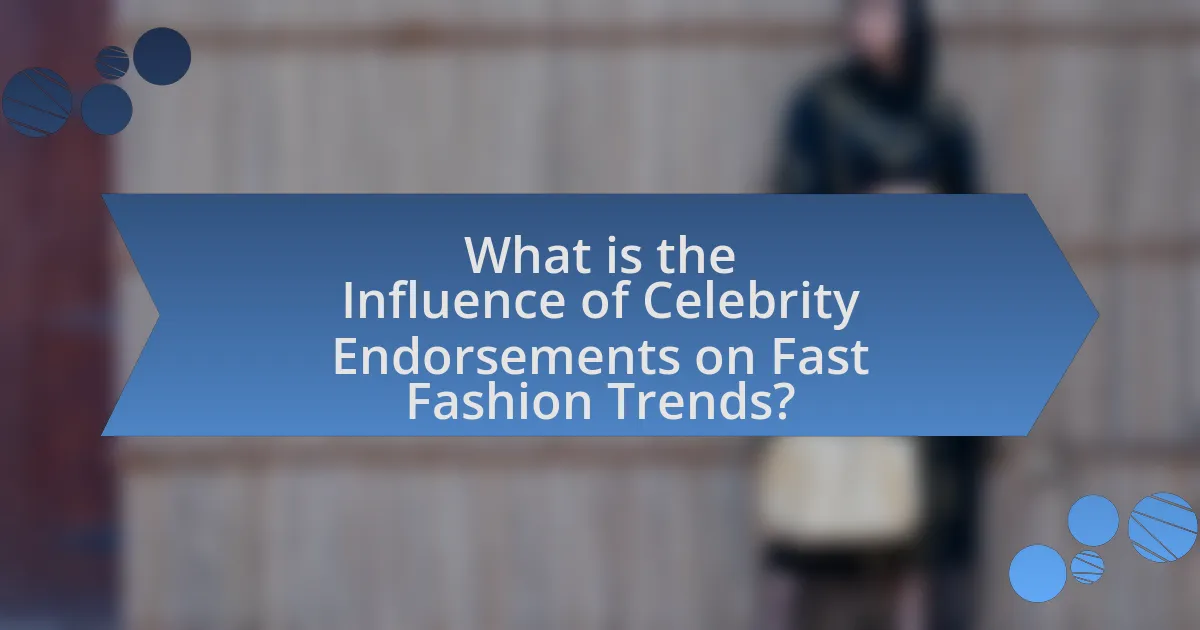
What is the Influence of Celebrity Endorsements on Fast Fashion Trends?
Celebrity endorsements significantly influence fast fashion trends by driving consumer purchasing behavior and shaping brand perceptions. Research indicates that when celebrities endorse fashion brands, their followers are more likely to purchase items associated with those endorsements. For instance, a study published in the Journal of Fashion Marketing and Management found that celebrity endorsements can increase brand awareness by up to 20% and positively affect consumer attitudes towards the brand. This influence is particularly pronounced among younger demographics, who often view celebrities as trendsetters. Consequently, fast fashion brands leverage these endorsements to quickly adapt to changing trends and consumer preferences, resulting in increased sales and market share.
How do celebrity endorsements shape consumer perceptions in fast fashion?
Celebrity endorsements significantly shape consumer perceptions in fast fashion by enhancing brand credibility and desirability. When well-known figures promote fast fashion brands, they create an association between the brand and their personal image, which can lead to increased consumer trust and a perception of higher quality. Research indicates that 70% of consumers are more likely to purchase a product endorsed by a celebrity they admire, demonstrating the powerful influence of celebrity status on consumer behavior. This effect is particularly pronounced in fast fashion, where trends change rapidly, and endorsements can drive immediate sales spikes, as seen with brands like Fashion Nova and their collaborations with influencers and celebrities.
What psychological factors make celebrity endorsements effective?
Celebrity endorsements are effective due to factors such as trust, attractiveness, and social proof. Trust is established when consumers perceive celebrities as credible sources, often influenced by their expertise or authenticity in a particular field. Attractiveness plays a significant role, as consumers are more likely to be persuaded by individuals they find appealing, which can enhance brand perception. Social proof occurs when consumers observe others, particularly admired figures, endorsing a product, leading them to believe that the product is desirable and worth purchasing. Research indicates that endorsements can increase purchase intentions by up to 50%, demonstrating the substantial impact of these psychological factors on consumer behavior.
How do celebrities impact brand loyalty among fast fashion consumers?
Celebrities significantly enhance brand loyalty among fast fashion consumers by leveraging their influence and visibility. When a celebrity endorses a fast fashion brand, it creates a perception of desirability and trendiness, which can lead to increased consumer attachment to that brand. Research indicates that 70% of consumers are more likely to purchase a product endorsed by a celebrity they admire, demonstrating the direct correlation between celebrity endorsements and consumer loyalty. Additionally, the emotional connection fans have with celebrities often translates into a favorable view of the brands they promote, further solidifying brand loyalty.
What role do social media platforms play in amplifying celebrity endorsements?
Social media platforms significantly amplify celebrity endorsements by providing a direct and expansive channel for celebrities to reach their audiences. These platforms enable celebrities to share endorsements instantly with millions of followers, enhancing visibility and engagement. For instance, a study by the Pew Research Center found that 72% of adults use social media, making it a crucial space for brands to leverage celebrity influence. Additionally, the interactive nature of social media allows followers to engage with content through likes, shares, and comments, further increasing the reach and impact of endorsements. This dynamic interaction fosters a sense of authenticity and relatability, which can lead to higher conversion rates for brands in the fast fashion industry.
How do influencers and celebrities collaborate to promote fast fashion brands?
Influencers and celebrities collaborate to promote fast fashion brands primarily through social media campaigns, sponsored posts, and exclusive collaborations. These partnerships leverage the large followings of influencers and celebrities to reach a wider audience, effectively driving brand awareness and sales. For instance, a study by the Journal of Fashion Marketing and Management found that 70% of young consumers are influenced by social media endorsements when making fashion purchases. This demonstrates the significant impact that these collaborations have on consumer behavior and fast fashion trends.
What metrics indicate the success of celebrity endorsements on social media?
Metrics that indicate the success of celebrity endorsements on social media include engagement rate, reach, conversion rate, and brand sentiment. Engagement rate measures interactions such as likes, comments, and shares relative to the audience size, reflecting how well the content resonates with followers. Reach quantifies the total number of unique users who see the endorsement, indicating its visibility. Conversion rate tracks the percentage of users who take a desired action, such as making a purchase after seeing the endorsement, demonstrating its effectiveness in driving sales. Brand sentiment assesses the overall perception of the brand in response to the endorsement, often analyzed through sentiment analysis tools that evaluate user comments and reactions. These metrics collectively provide a comprehensive view of the endorsement’s impact on consumer behavior and brand perception in the fast fashion industry.
Why are celebrity endorsements particularly effective in the fast fashion industry?
Celebrity endorsements are particularly effective in the fast fashion industry because they leverage the aspirational nature of celebrity culture to drive consumer behavior. Fast fashion brands often target young consumers who idolize celebrities, making endorsements a powerful tool for influencing purchasing decisions. Research indicates that 70% of millennials are more likely to buy a product endorsed by a celebrity they admire, highlighting the direct impact of celebrity influence on consumer choices. Additionally, celebrities often embody the latest trends, creating a sense of urgency and desirability around the products they promote, which aligns with the fast-paced nature of the fashion industry.
What trends in fast fashion have been directly influenced by celebrity endorsements?
Celebrity endorsements have directly influenced trends in fast fashion by driving the popularity of specific styles, such as athleisure and streetwear. For instance, when celebrities like Kim Kardashian and Rihanna promote brands like Yeezy and Fenty, their massive social media followings lead to increased consumer interest and sales in those styles. According to a study by the Journal of Fashion Marketing and Management, 70% of consumers reported that celebrity endorsements significantly impacted their purchasing decisions, highlighting the effectiveness of this marketing strategy in shaping fast fashion trends.
How do fast fashion brands select celebrities for endorsements?
Fast fashion brands select celebrities for endorsements based on their marketability, social media influence, and alignment with brand values. Brands analyze a celebrity’s follower demographics, engagement rates, and public image to ensure they resonate with the target audience. For instance, a study by the Journal of Fashion Marketing and Management found that endorsements from celebrities with a strong social media presence can increase brand visibility and consumer purchase intention by up to 30%. This data underscores the importance of selecting celebrities who not only appeal to the brand’s demographic but also have a significant online influence.
How do consumer demographics affect the impact of celebrity endorsements?
Consumer demographics significantly influence the impact of celebrity endorsements by determining how different groups perceive and respond to these endorsements. For instance, younger consumers, particularly millennials and Gen Z, are more likely to be influenced by celebrity endorsements due to their high engagement with social media platforms where these endorsements are prevalent. Research indicates that 70% of millennials are influenced by the opinions of celebrities they follow, which underscores the effectiveness of endorsements among this demographic. In contrast, older consumers may prioritize brand reputation and product quality over celebrity influence, leading to a diminished impact of endorsements in this group. Additionally, factors such as income level, education, and cultural background further shape consumer attitudes towards celebrity endorsements, affecting their purchasing decisions and brand loyalty.
What age groups are most influenced by celebrity endorsements in fast fashion?
Individuals aged 18 to 24 are the most influenced by celebrity endorsements in fast fashion. This demographic is particularly responsive due to their high engagement with social media platforms where such endorsements are prevalent. Research indicates that 70% of young consumers are more likely to purchase items endorsed by celebrities, highlighting the significant impact of celebrity influence on their buying decisions.
How do cultural differences shape the effectiveness of celebrity endorsements?
Cultural differences significantly shape the effectiveness of celebrity endorsements by influencing consumer perceptions and values associated with the endorsed products. For instance, in collectivist cultures, such as Japan, consumers may respond more positively to endorsements from celebrities who emphasize community and harmony, while in individualistic cultures, like the United States, endorsements that highlight personal achievement and uniqueness may resonate better. Research by the Journal of Advertising found that cultural context affects how consumers interpret celebrity credibility and relatability, impacting their purchasing decisions. Therefore, understanding these cultural nuances is crucial for brands aiming to leverage celebrity endorsements effectively in diverse markets.
What are the potential downsides of celebrity endorsements in fast fashion?
Celebrity endorsements in fast fashion can lead to several potential downsides, including the promotion of unsustainable consumption patterns. When celebrities endorse fast fashion brands, they often encourage their followers to purchase low-cost, trendy items that contribute to environmental degradation and waste. For instance, the fast fashion industry is responsible for producing 92 million tons of waste annually, as reported by the United Nations Environment Programme. Additionally, celebrity endorsements can create unrealistic beauty standards and foster a culture of disposability, where consumers feel pressured to frequently update their wardrobes to keep up with trends. This cycle not only harms the environment but also perpetuates social inequalities, as the labor conditions in fast fashion production are often exploitative.
How can negative publicity surrounding a celebrity affect fast fashion brands?
Negative publicity surrounding a celebrity can significantly harm fast fashion brands that rely on their endorsements. When a celebrity faces backlash, it often leads to a decline in consumer trust and brand association, resulting in decreased sales and negative brand perception. For instance, when a celebrity is involved in a scandal, studies show that brands linked to them can experience a drop in stock prices by as much as 5% within days of the incident. This correlation highlights how fast fashion brands may suffer financially and reputationally due to their association with controversial figures.
What ethical considerations arise from celebrity endorsements in fast fashion?
Celebrity endorsements in fast fashion raise significant ethical considerations, primarily concerning sustainability, labor practices, and consumerism. Fast fashion brands often rely on low-cost production methods that can exploit workers in developing countries, leading to poor working conditions and inadequate wages. For instance, a report by the Ethical Fashion Initiative highlights that many garment workers earn less than the living wage, which raises questions about the moral responsibility of celebrities promoting these brands. Additionally, the environmental impact of fast fashion, characterized by high levels of waste and pollution, is exacerbated by celebrity endorsements that encourage rapid consumption. Research from the Ellen MacArthur Foundation indicates that the fashion industry is responsible for 10% of global carbon emissions, further emphasizing the ethical implications of promoting unsustainable practices. Thus, celebrity endorsements in fast fashion not only influence consumer behavior but also perpetuate systemic issues related to ethics in labor and environmental sustainability.
How can brands effectively leverage celebrity endorsements for maximum impact?
Brands can effectively leverage celebrity endorsements for maximum impact by aligning the celebrity’s image and values with the brand’s identity and target audience. This alignment ensures authenticity, which is crucial as studies show that 70% of consumers are more likely to purchase a product endorsed by a celebrity they admire. Additionally, brands should utilize social media platforms to amplify the endorsement, as 49% of consumers rely on influencer recommendations when making purchasing decisions. Engaging the celebrity in creative campaigns that resonate with current trends can further enhance visibility and consumer connection, leading to increased brand loyalty and sales.
What strategies can fast fashion brands implement to enhance endorsement effectiveness?
Fast fashion brands can enhance endorsement effectiveness by strategically selecting celebrities whose personal brand aligns with their target audience and values. This alignment increases authenticity, making endorsements more relatable and credible to consumers. For instance, brands like H&M have successfully collaborated with celebrities such as Beyoncé, whose influence resonates with a diverse demographic, thereby driving sales and brand loyalty. Additionally, leveraging social media platforms for real-time engagement and interactive campaigns can amplify the reach and impact of endorsements, as seen with brands that utilize Instagram and TikTok to showcase celebrity partnerships. Research indicates that 70% of consumers are more likely to purchase a product endorsed by a celebrity they admire, highlighting the importance of strategic alignment and social media engagement in enhancing endorsement effectiveness.
How can brands measure the ROI of celebrity endorsements in fast fashion?
Brands can measure the ROI of celebrity endorsements in fast fashion by analyzing sales data, social media engagement, and brand awareness metrics. Specifically, they can track sales spikes during and after endorsement campaigns, correlating these with the celebrity’s reach and influence. For instance, a study by Nielsen found that 92% of consumers trust recommendations from individuals over brands, indicating that effective endorsements can significantly boost sales. Additionally, brands can utilize tools like Google Analytics to assess website traffic and conversion rates linked to specific campaigns, providing concrete evidence of the endorsement’s impact.
What best practices should brands follow when engaging in celebrity endorsements?
Brands should ensure alignment between the celebrity’s image and their brand values when engaging in celebrity endorsements. This alignment fosters authenticity, which is crucial for consumer trust; a study by the Journal of Advertising Research found that 70% of consumers are more likely to purchase a product endorsed by a celebrity who reflects their own values. Additionally, brands should conduct thorough research on the celebrity’s past endorsements and public behavior to avoid potential controversies that could negatively impact their reputation. Engaging in transparent communication about the partnership can also enhance credibility, as consumers appreciate honesty regarding endorsements. Lastly, measuring the effectiveness of the endorsement through metrics such as engagement rates and sales performance is essential for assessing the return on investment and refining future strategies.


